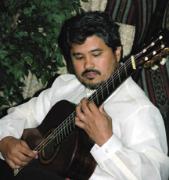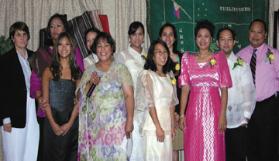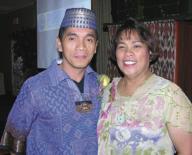| When the Philippine-American Association of Madison and Neighboring Areas (PAMANA) recently celebrated this year's Philippine Independence Day at Hilton Garden Inn in Middleton, Wis., its officers chose Harana (or Serenade) as the main entertainment fare of the evening. The serenade, Philippine-style, was graciously provided by Dr. Angelo Favis (top, right). HARANA In Philippine culture, Harana is a basic, necessary part of courtship, or ligawan. Not long ago, especially in the rural areas, if a man wants to be taken seriously by a woman, he has to introduce himself to the woman's family, especially her parents, first. If he wants to be welcomed in every visit, he has to bring some pasalubong, or gifts. Gifts may be in the form of flowers and food items, or a household necessity. Before a man can even get to this point, however, he has to harana, or serenade his object of affection at night in front of her house, near the window, and sing love songs. He is usually accompanied by close friends, or barkada, who provide backup music and moral support. When the parents of the woman decide to admit the group inside their home, the man starts his introductions, with his barkada confirming his words. The relationship between the family and the suitor grows as the man continues to pursue his love interest through numerous haranas, good deeds, and helpful actions. It is said that a suitor has to perform menial jobs, including fetching water from wells and helping the father do his farm work, to be accepted as part of the family. While this tradition is no longer practiced widely, Filipinos everywhere still keep harana as an essential part of their being, maybe not as part of the traditional courtship as it used to be, but as a way to express the beauty of a culture that is never lost in the Filipino's soul. Dr. Angelo Favis Dr. Angelo Favis showed how guitar strings can express various emotions, with or without any vocal help. With long years of training in guitar playing, Favis has successfully combined the old and the new through his extraordinary ability to adjust his strings and his strumming depending on his audience. Favis earned his bachelor's and master's degrees in guitar performance from the San Francisco Conservatory of Music, and later, his doctoral degree in musical arts from the Manhattan School of Music. A prize winner in many competitions including the American String Teachers Association National Solo Competition and the Eighth International Solo Competition sponsored by the Guitar Foundation of America, Favis has been performing with his guitar here in the U.S. and abroad. At present, he is assistant professor of guitar at the Illinois State University. On this special occasion, Favis gifted his kababayans (countrymen) and guests with his renditions of original Filipino compositions such as: Sampaguita, by Dolores Paterno; Ay, Kalisud!, a traditional folk song from the Visayan Region; Maalaala mo kaya, by Constancio de Guzman; Hatinggabi, by Antonio Molina; Mutya ng Pasig, by Nicanor Abelardo; and Minamahal kita, by Miguel Velarde Jr. What a sweet way to celebrate Philippine Independence Day! |
| Philippine serenade in celebration of Independence Day by Heidi M. Pascual |
 |
 |
 |
| (Above) Dr. Angelo Favis; (far left) Incoming board of directors of Phil. Association for Madison and Neighboring Areas gets ready to build upon the past accomplishments of Al Poliarco (left center), shown with incoming president, Beth Reyes. |